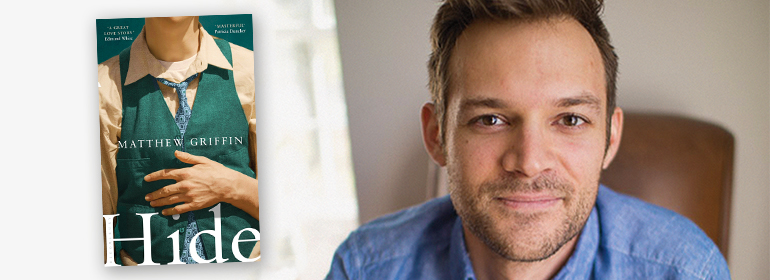“Masterfully written, it manages to be subtle and heartfelt, but also wrought and visceral”, says Stephen Boylan in his review of Hide by Matthew Griffin
Stephen Boylan’s review of Hide by Matthew Griffin first appeared in the September 2016 issue of GCN magazine.
As we all now know, one of the most important aspects of last year’s marriage referendum was how central our personal stories became to the narrative. Those evenings spent knocking on doors, putting ourselves out there, were invaluable in getting the Yes vote across the line.
Amidst that ability to share, however, came the poignant realisation that we are blessed to be living when we are. Many of us are lucky to have our friends, our partners, and supportive workplaces and families, but there are those in generations long gone who weren’t so lucky, who lived in secrecy and fear and silence, never thinking that something like same-sex marriage could ever be a possibility.
Post-World War II
While many people were never fortunate to meet another gay person, never mind fall in love with one, those couples did exist; couples who had to be incredibly discreet, but who still found that connection, and managed to build a life together. This is the central idea behind Matthew Griffin’s stunning début novel, Hide. Set in the aftermath of World War II, the story centres on Wendell and Frank, a taxidermist and war veteran respectively, who cross paths in small town America and fall in love. Following the pair up to the present day, the book’s starting point is when one of the now-elderly couple falls ill.
“The genesis of the novel was actually my grandparents,” Griffin tells me from his home in New Orleans. “I’d watched them take care of each other at the end of their lives and I was thinking a lot about what it would take to sustain a relationship over so many decades. I was primarily interested in how a relationship changes, particularly in the face of mortality, and in the beauty and futility of trying to hold on to someone as they disappear.”
Regarding society as, rightly for the time, hostile to their relationship, Frank and Wendell decide to absent themselves from the world. They buy a house, having viewed it separately days apart so as not to arouse suspicion.
Cut All Ties
They cut all ties with their families; Wendell walks out on his family when he is just 16 (“I wasn’t any of the things my parents wanted me to be”), and, in one flash of disgust at a Pride march, it’s clear they never manage to cultivate any sort of relationship to the wider gay community. As Griffin notes, “Wendell and Frank have been living together in secret for 25 years before Stonewall, and they’ve been without a community for so long that it seems foreign to them. The public displays of sexual liberation that often go along with the gay rights movement are sort of shocking and distasteful to them too.”
As Frank’s condition deteriorates, and Wendell’s frustration and inability to cope grow, cruelty and short-temperedness quickly begin to rule the roost. For the author, there was no easy way out when it came to tackling the difficult issues at the heart of the text. “All of the most emotionally intense scenes in the book were really, really difficult for me to write. One of my teachers once told me that if you want to break anyone else’s heart, you have to break your own.” He admits that he could only finish those emotional scenes in the final stages of drafting the book.
And what a book Hide is. Each chapter holds a thousand tiny truths, not just what it is to be in a relationship, or to be gay, but what it is to simply negotiate life. Masterfully written, it manages to be subtle and heartfelt, but also wrought and visceral. Undoubtedly one of the novels of the year, this is a book that demands to be endlessly read, gifted, and read again. Spread the word.
© 2016 GCN (Gay Community News). All rights reserved.

comments. Please sign in to comment.